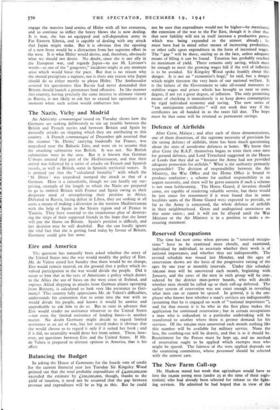Balancing the Budget
In asking the House of Commons for the fourth vote of credit for the current financial year last Tuesday Sir Kingsley Wood pointed out that the total probable expenditure of £4,00o,000,000 exceeded the estimate by £zoo,000,000, though, thanks to the yield of taxation, it need not be assumed that the gap between revenue and expenditure will be as big as this. But he could not be sure that expenditure would not be higher—he mentioned the extension of the war to the Far East, though it is clear that that new liability will not in itself increase a productive power which was being expanded to the utmost already ; he must have had in mind other means of increasing production, or other calls upon expenditure in the form of increased wages. The " gap " will be there, staring us in the face, unless adequate means of filling it can be found. Taxation has probably reached its maximum of yield. There remains only saving, which must be enough to meet the growing wages bill if the evil of inflation is to be avoided. Sir Kingsley Wood spoke frankly about this danger. It is not an " economist's bogy," he said, but a danger which might threaten the very basis of our national welfare. It is the failure of the Government to take all-round measures to stabilise wages and prices which has brought us near to some degree, if not yet a great degree, of inflation. The only promising means of checking it immediately is to keep down consumption by rigid individual economy and saving. The new series of " tax anticipation certificates " will not work that way if the certificates are all handed in as the taxes fall due. The hope must be that some will be retained as permanent savings.






















 Previous page
Previous page